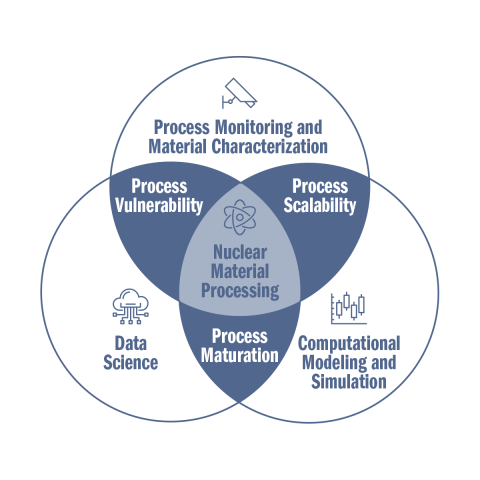Research Areas
Science and technology pillars drive research focus

Nuclear material processing is at the heart of Athena and involves handling irradiated fuel, targets, and relevant surrogates and processing the starting material to separate plutonium and other materials of interest. These demonstrations will include measuring fundamental solvent extraction parameters and operation of counter-current solvent extraction equipment. The process demonstration activities will be closely coordinated with the other three science and technology (S&T) activities.
Process monitoring and material characterization will focus on developing capability and expertise in real-time online process monitoring as well as offline analyses of aqueous separation systems. These capabilities will be integrated into the process demonstration activities.
Under computational modeling and simulation, experimentalists and modelers will be tasked with using process and chemistry models to develop flowsheets to support demonstration activities. By learning how to use these established modeling capabilities, program participants will begin to build the fundamentals necessary to then improve the current state of the art.
The data science effort will work to integrate data scientists with experimentalists. Data scientists will be exposed to the fundamentals of solvent extraction through lectures, facility tours, and observation of experiments. Datasets and flowsheets from processing demonstrations will familiarize the data scientists with available data types (spectra, concentration measurements, etc.) and an understanding of where in the process data are collected. With this information, data scientists can then explore incorporating advanced data science techniques.
Addressing grand challenges in irradiated fuel processing
At the intersection of the S&T pillars are three challenges related to plutonium and actinide processing for nonproliferation: process scalability, process vulnerability, and process maturation.
The process scalability challenge explores whether the observables or behaviors seen in the testing environments scale to smaller or larger systems that may be more applicable within the international community. The equipment established by Athena will be scaled to sizes relevant to select applications. Computational modeling and process monitoring methods will be incorporated to bound several aspects of the scalability question. Developing expertise in fundamental chemistry and reprocessing equipment operations will also enable informed analysis of processing under various scales and identify knowledge gaps to guide the implementation and use of modeling and monitoring tools.
The process vulnerability challenge encompasses the prediction, detection, and observation of process anomalies or unexpected process changes when a facility conducting a known or declared process varies. The approach to addressing this challenge will couple real-time process monitoring with artificial intelligence to drive toward a predictive capability to support multiple nonproliferation missions.
The process maturation challenge involves understanding the evolution and maturation of nuclear processing facilities over time, including how alternative processing methods might be implemented over the maturation of a program. The flexible nature of the Athena testing environments will allow exploration of emerging methods for recovering materials from irradiated fuel.